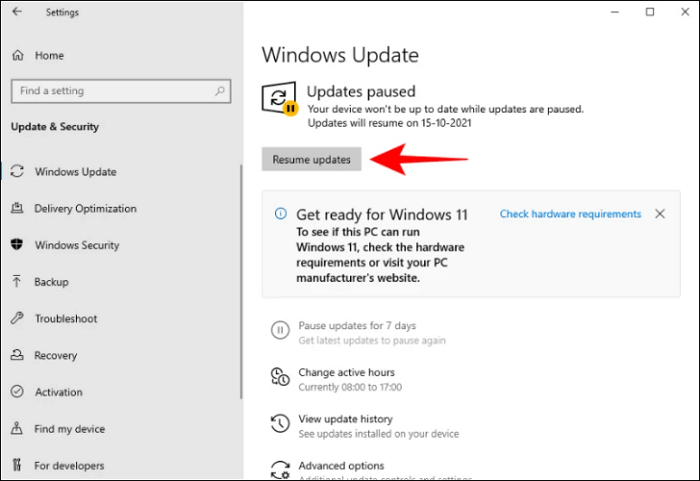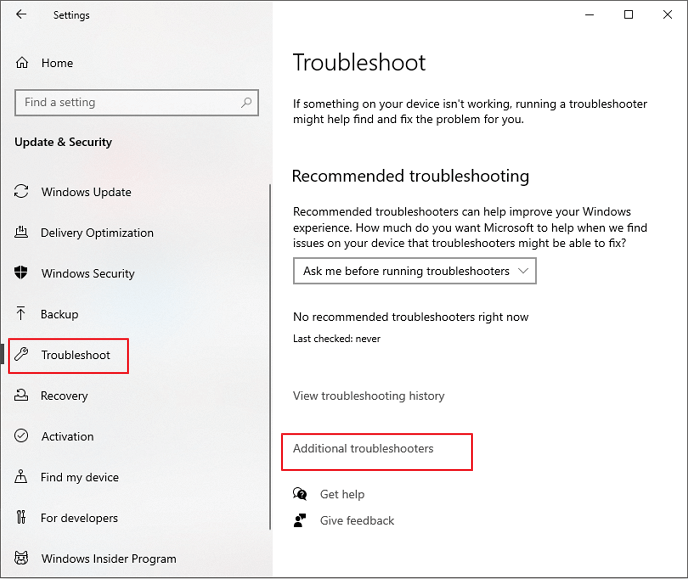Troubleshoot Windows 11 Not Showing Up in Windows Update
We'll walk you through how to fix Windows 11 not showing up in Windows update to get Microsoft's latest OS. Here's the overview of the solutions.
| Workable Solutions | Step-by-step Troubleshooting |
|---|---|
| 1. Check Your PC | Download Qiling Windows 11 Upgrade Checker. Click the Check Now button to...Full steps |
| 2. Check Windows Update | Press Windows + S to open Settings and choose "Update & Security"...Full steps |
| 3. Restart Your PC | Click the "Start" icon. Go to "Shut down or sign out > Restart."...Full steps |
| 4. Run Update Troubleshooter | Go to "Start > Settings > Update & security > Troubleshoot". Click on...Full steps |
| 5. Upgrade to Windows 11 | If you still fail to receive the notification after you have tried these solutions...Full steps |
Windows 11 Not Showing Up in Windows Update - Reddit
Windows 11 rolled out to eligible devices earlier this month, as Microsoft launched its new operating system on Oct, 5. Everyone using Windows 10 can upgrade for free if they have a compatible computer, but a lot of people say that Windows 11 not showing up in Windows update. Here's the case:
"I've done everything correctly. The Health Check app says everything is good, and I have updated to the latest Windows 10 insider build. For some reason Windows 11 won't pop up, it just keeps saying I'm up to date. Any help?"
Usually, if your computer can meet the requirements, you can receive the Windows 11 update notification. If you find that the Windows 11 update isn't showing and you can't update your PC, here are a few things you must check to allow the update to come through.
Method 1. Check If Your PC Meets the Requirements
If Windows 11 update doesn't show up in Windows 10, you should check your PC to see if it meets the requirements. Qiling provides you with a free Windows 11 compatibility checker that can check your PC easily and quickly. Visit the download page and install the software, and run it to quickly know whether your computer is ready for Windows 11 or not.
Step 1. Download Qiling Windows 11 Upgrade Checker.
Step 2. Click the Check Now button to start.

Step 3. The Windows 11 compatibility result window will soon appear. All the incompatible and compatible configuration items will be listed.

Method 2. Ensure that Windows Update Is Working
If you have paused Windows updates in the past and forgot about it, or that the feature was disabled by an app or a bug. To check if your Windows update option is working well, follow the steps below.
Step 1. Press Windows + S to open Settings and choose "Update & Security".

If your Updates are paused, click on Resume updates.
Step 2. If your Updates are paused, click on "Resume updates".

Method 3. Restart Your PC to Fix Windows 11 Not Showing Up
This is the easiest method but worth trying. As you know, you can remove the damaged or corrupt temporary files that make Windows 11 updates not working on your PC. Therefore, make sure to give your PC a soft reboot and check to see if any updates are available.
- Click the "Start" icon.
- Go to "Shut down or sign out > Restart."

Method 4. Run Windows Update Troubleshooter to Fix It
Windows has a built-in troubleshooter to diagnose problems and offer solutions. It can fix some Windows Update issues including Windows Update not working, Windows Update not showing updates, Windows update stuck, and more. Here's how to run it:
Step 1. Go to "Start > Settings > Update & security > Troubleshoot".
Step 2. Click on "Additional troubleshooters".

Step 3. Click on "Windows Update > Run the troubleshooter".

The troubleshooter will start looking for problems and will offer potential fixes if any issues are found.
Method 5. Upgrade to Windows 11 with Windows 11 Media Creation Tool
If you still fail to receive the notification after you have tried these solutions, you can upgrade to Windows 11 with Windows 11 media creation tool. You'll need an empty USB flash drive (at least 8GB) for this purpose.
Windows 11/10 Media Creation Tool: How to Download and Use It?
Microsoft provides a very useful Windows 10 Media Creation Tool for users to upgrade a PC, do a completely clean install, create a bootable installation USB drive.

Additional Tips - How to Recover Data After Windows Update
Don't worry even if you have lost data when you upgrade to Windows 11. Qiling hard drive data recovery software can restore data from an SD card, SSD, USB flash drive, memory card, camcorder after updating, deleting, and formatting. Follow the steps below to get back your data.
Step 1. Select file types and click "Next" to start
Launch Deep Data Recovery, select file types and click "Next" to start.

Step 2. Select a location and start scanning
Choose the partition where you lost data. Then, click "Scan".

Step 3. Filter and preview files
Use the file format filter on the left or upper right corner to find the files you need. Then, you can click the "Preview" button or double-click a file to preview its content.

Step 4. Recover lost data or files
Click the checkbox next to the file and click "Recover" to restore the lost data to a secure place.
Conclusion
You can try any of the solutions to fix Windows 11 not showing up in Windows update. Let us know if you still have problems with Windows 11 update, and we'll try our best to help you.
Related Articles
- Microsoft Word Has Stopped Working [9 Useful Fixes]
- Recover 0 Byte Files in Windows 10/8/7
- How to Convert a Shortcut File into Original File
- How to Restore Missing Desktop Icons and Files in Windows 10/11